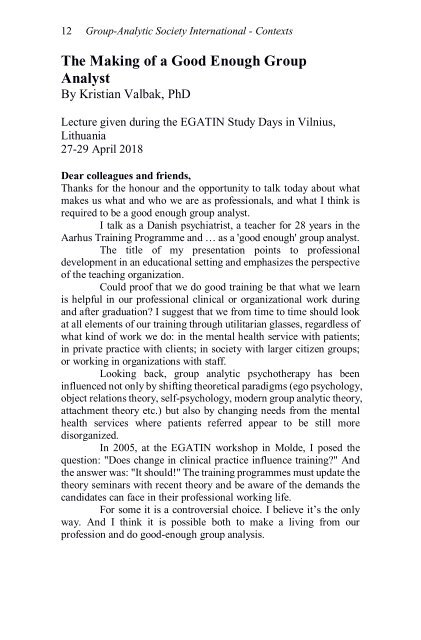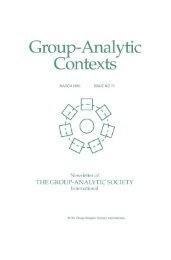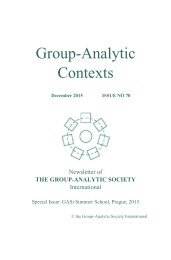Group-Analytic Contexts, Issue 80, June 2018
Create successful ePaper yourself
Turn your PDF publications into a flip-book with our unique Google optimized e-Paper software.
12 <strong>Group</strong>-<strong>Analytic</strong> Society International - <strong>Contexts</strong><br />
The Making of a Good Enough <strong>Group</strong><br />
Analyst<br />
By Kristian Valbak, PhD<br />
Lecture given during the EGATIN Study Days in Vilnius,<br />
Lithuania<br />
27-29 April <strong>2018</strong><br />
Dear colleagues and friends,<br />
Thanks for the honour and the opportunity to talk today about what<br />
makes us what and who we are as professionals, and what I think is<br />
required to be a good enough group analyst.<br />
I talk as a Danish psychiatrist, a teacher for 28 years in the<br />
Aarhus Training Programme and … as a 'good enough' group analyst.<br />
The title of my presentation points to professional<br />
development in an educational setting and emphasizes the perspective<br />
of the teaching organization.<br />
Could proof that we do good training be that what we learn<br />
is helpful in our professional clinical or organizational work during<br />
and after graduation? I suggest that we from time to time should look<br />
at all elements of our training through utilitarian glasses, regardless of<br />
what kind of work we do: in the mental health service with patients;<br />
in private practice with clients; in society with larger citizen groups;<br />
or working in organizations with staff.<br />
Looking back, group analytic psychotherapy has been<br />
influenced not only by shifting theoretical paradigms (ego psychology,<br />
object relations theory, self-psychology, modern group analytic theory,<br />
attachment theory etc.) but also by changing needs from the mental<br />
health services where patients referred appear to be still more<br />
disorganized.<br />
In 2005, at the EGATIN workshop in Molde, I posed the<br />
question: "Does change in clinical practice influence training?" And<br />
the answer was: "It should!" The training programmes must update the<br />
theory seminars with recent theory and be aware of the demands the<br />
candidates can face in their professional working life.<br />
For some it is a controversial choice. I believe it’s the only<br />
way. And I think it is possible both to make a living from our<br />
profession and do good-enough group analysis.













